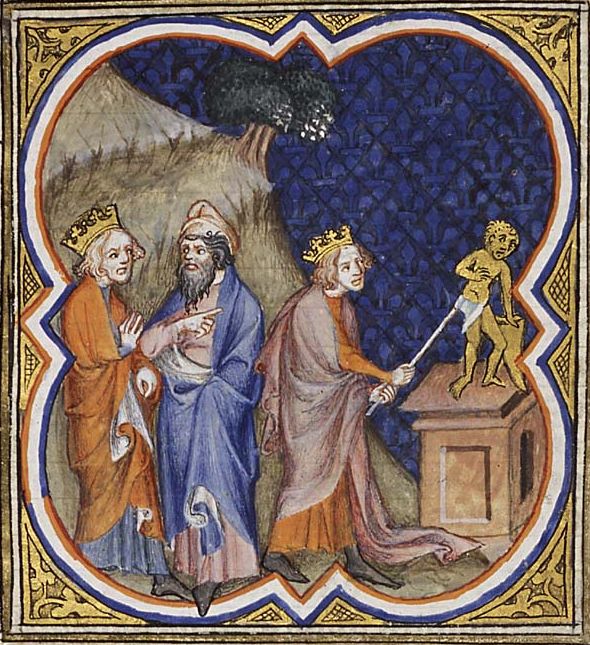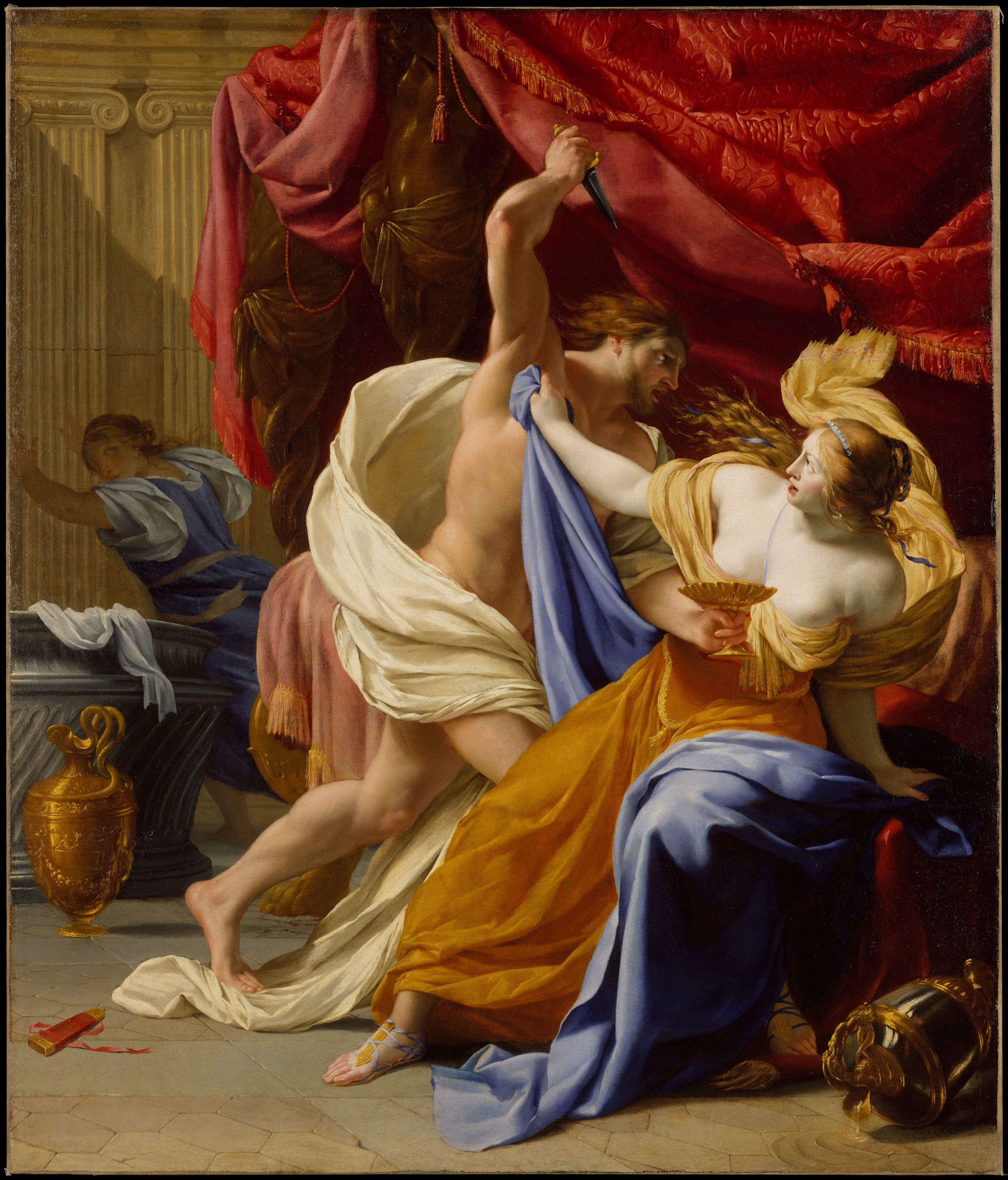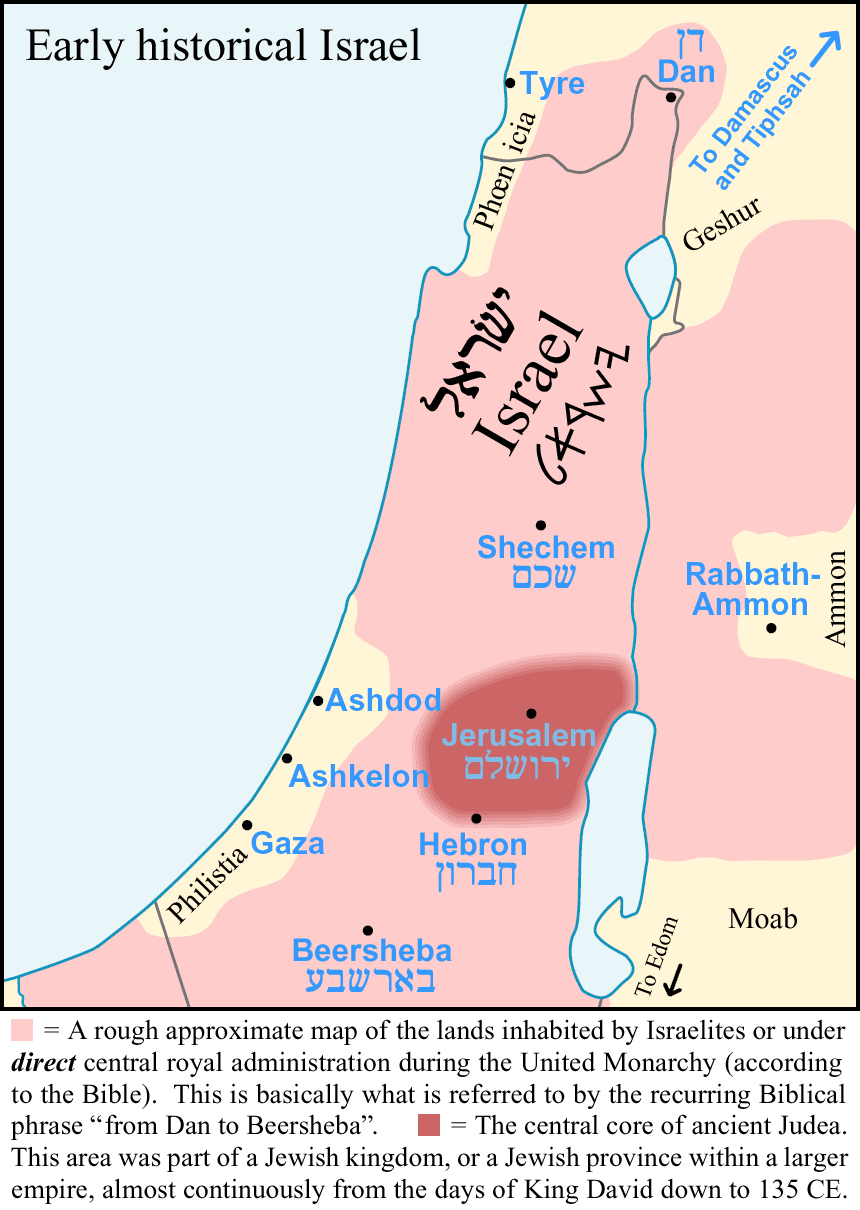|
Maacah
Maacah (or Maakah; he, ''Maʿăḵā'', "crushed"; Maacha in the Codex Alexandrinus, Maachah in the KJV) is a non-gender-specific personal name used in the Bible to refer to a number of people. *A child of Abraham's brother Nachor, evidently a boy. (Genesis 22:23,24) *The wife of Machir, Manasseh's son. (1 Chronicles 7:15-16) *One of the wives of Hezron's son Caleb. (1 Chronicles 2:48) *A wife of David, and daughter of Talmai, King of Geshur (1 Chronicles 3:2), a near neighbor of the Maachathites. David fathered Absalom and Tamar by her. *A King of Gath, to whose son, Achish, Shimei's servants fled early in Solomon's reign (1 Kings 2:39). About a half-century earlier than this event, David with 600 men had fled to Achish, son of Maoch, King of Gath (1 Samuel 27:2); but the identification of Maoch is doubtful, though kinship is exceedingly probable. * Daughter of Absalom, favorite wife of Rehoboam, mother of Abijah of Judah, and grandmother of Asa of Judah. She serve ... [...More Info...] [...Related Items...] OR: [Wikipedia] [Google] [Baidu] |
Abel-beth-maachah
Tel Abel Beth Maacah ( he, תֵּל אָבֵל בֵּית מַעֲכָה; ar, تل آبل القامع, translit=Tell Abil el-Qameḥ, lit=) is a large archaeological tell with a small upper northern section and a large lower southern one, connected by a saddle. It is located on the northern border of present-day Israel, about 2 km south of the town of Metula and about 6.5 km west of Tel Dan. The survey and excavations conducted in recent years have shown that the site had been inhabited during the Bronze and Iron Ages, as well as the Persian, Hellenistic, Byzantine, Early Islamic, Crusader, Mamluk and Ottoman periods. Since at least the early 13th century CE the mound was the location of the Arab village of Abil al-Qamh, depopulated in 1948. However, the lower mound was not occupied after the Iron Age I (late 11th/early 10th centuries BCE), when occupation seems to have concentrated on the upper mound. The site was fortified by walls and a rampart in the Midd ... [...More Info...] [...Related Items...] OR: [Wikipedia] [Google] [Baidu] |
Absalom
Absalom ( he, ''ʾAḇšālōm'', "father of peace") was the third son of David, King of Israel with Maacah, daughter of Talmai, King of Geshur. 2 Samuel 14:25 describes him as the handsomest man in the kingdom. Absalom eventually rebelled against his father and was killed during the Battle of Ephraim's Wood. Biblical account Background Absalom, David's third son, by Maacah, was born in Hebron. At an early age, he moved, along with the transfer of the capital, to Jerusalem, where he spent most of his life. He was a great favorite of his father and of the people. His charming manners, personal beauty, insinuating ways, love of pomp, and royal pretensions captivated the hearts of the people from the beginning. He lived in great style, drove in a magnificent chariot, and had fifty men run before him. Little is known of Absalom's family life, but the biblical narrative states that he had three sons and one daughter, Tamar, who is described as a beautiful woman. From the lang ... [...More Info...] [...Related Items...] OR: [Wikipedia] [Google] [Baidu] |
Asa Of Judah
Asa (; el, Ασά; la, Asa) was, according to the Hebrew Bible, the third king of the Kingdom of Judah and the fifth king of the House of David. The Hebrew Bible gives the period of his reign between 40–41 years. His reign is dated between 913–910 BC to 873–869 BC. He was succeeded by Jehoshaphat, his son (by Azubah). According to Thiele's chronology, when Asa became very ill, he made Jehoshaphat coregent. Asa died two years into the coregency. Asa was zealous in maintaining the traditional worship of God, and in rooting out idolatry, with its accompanying immoralities. After concluding a battle with Zerah of Ethiopia in the 10th year of his reign, there was peace in Judah () until the 36th year of Asa's reign (). In his 36th year he was confronted by Baasha, king of Israel. He formed an alliance with Ben-Hadad I, king of Aram Damascus, and using a monetary bribe, convinced him to break his peace treaty with Baasha and invade the Northern Kingdom (). He died grea ... [...More Info...] [...Related Items...] OR: [Wikipedia] [Google] [Baidu] |
Abijah Of Judah
Abijam (; grc-x-biblical, Αβιού, Aviou; la, Abiam) was, according to the Hebrew Bible, the fourth king of the House of David and the second of the Kingdom of Judah. He was the son of Rehoboam and the grandson of Solomon. The Books of Chronicles refers to him as Abijah.; la, Abia In the Hebrew Bible Family Abijam is reported in the books of Kings and Chronicles as being the son of Maacah or Micaiah, and father of King Asa of Judah. Some scholars believe the biblical accounts of Abijam's family to be contradictory; however, a study of Hebrew linguistics may remove any seeming contradictions. One of the alleged contradictions is that Maacah is sometimes described as the daughter of Absalom, and elsewhere the daughter of Uriel. Absalom is described as only having one daughter, Tamar. Apologists have countered by arguing that in Hebrew, "daughter" and "granddaughter" are the same word. Similarly, Maacah is initially described as Abijah's mother, but subsequently described as t ... [...More Info...] [...Related Items...] OR: [Wikipedia] [Google] [Baidu] |
Tamar (2 Samuel)
Tamar was a princess of Israel, the daughter of King David and sister of Absalom in 2 Samuel in the Hebrew Bible. In the biblical narrative (), she is raped by her half-brother Amnon. Biblical narrative Tamar was the daughter of King David and Maacah, who was the daughter of Talmai, king of Geshur. Absalom was her brother and Amnon her half-brother. In the narrative, Amnon became obsessed with Tamar, said to be beautiful like her brother, Absalom. Amnon's friend and cousin Jonadab devised a ruse in which Amnon feigned illness and asked Tamar to prepare him food. When she brought it to him in his chamber, Amnon refused to eat until all the king's servants present in the room had left, then pressed her for sex. Despite her vehement refusal, he raped her. Afterward, Amnon demanded that Tamar leave his room, despite her request that she be married so that her name would not be stained, and as the Torah commands. When she refused to leave, he ordered one of his servants to take he ... [...More Info...] [...Related Items...] OR: [Wikipedia] [Google] [Baidu] |
Rehoboam
Rehoboam (; , ; , ; la, Roboam, ) was, according to the Hebrew Bible, the last monarch of the United Kingdom of Israel and the first monarch of the Kingdom of Judah after the former's split. He was a son of and the successor to Solomon and a grandson of David. In the account of I Kings and II Chronicles, Rehoboam was initially a king of the United Monarchy, but later saw his rule limited to only the Kingdom of Judah in the south following a rebellion by the ten northern tribes of Israel in 932/931 BCE, which led to the formation of the independent Kingdom of Israel under the rule of Jeroboam in the north. Biblical background According to the '' Jewish Encyclopedia'', "Solomon's wisdom and power were not sufficient to prevent the rebellion of several of his border cities. Damascus under Rezon secured its independence romSolomon; and Jeroboam, a superintendent of works, his ambition stirred by the words of the prophet Ahijah (), fled to Egypt. Thus before the death of Solom ... [...More Info...] [...Related Items...] OR: [Wikipedia] [Google] [Baidu] |
Maoch
Maacah (or Maakah; he, ''Maʿăḵā'', "crushed"; Maacha in the Codex Alexandrinus, Maachah in the KJV) is a non-gender-specific personal name used in the Bible to refer to a number of people. *A child of Abraham's brother Nachor, evidently a boy. (Genesis 22:23,24) *The wife of Machir, Manasseh's son. (1 Chronicles 7:15-16) *One of the wives of Hezron's son Caleb. (1 Chronicles 2:48) *A wife of David, and daughter of Talmai, King of Geshur (1 Chronicles 3:2), a near neighbor of the Maachathites. David fathered Absalom and Tamar by her. *A King of Gath, to whose son, Achish, Shimei's servants fled early in Solomon's reign (1 Kings 2:39). About a half-century earlier than this event, David with 600 men had fled to Achish, son of Maoch, King of Gath (1 Samuel 27:2); but the identification of Maoch is doubtful, though kinship is exceedingly probable. * Daughter of Absalom, favorite wife of Rehoboam, mother of Abijah of Judah, and grandmother of Asa of Judah. She serve ... [...More Info...] [...Related Items...] OR: [Wikipedia] [Google] [Baidu] |
Aramaeans
The Arameans ( oar, 𐤀𐤓𐤌𐤉𐤀; arc, 𐡀𐡓𐡌𐡉𐡀; syc, ܐܪ̈ܡܝܐ, Ārāmāyē) were an ancient Semitic-speaking people in the Near East, first recorded in historical sources from the late 12th century BCE. The Aramean homeland was known as the land of Aram and encompassed central regions of modern Syria. At the beginning of the 1st millennium BCE, a number of Aramean states were established throughout the western regions of the ancient Near East. The most notable was the Kingdom of Aram-Damascus, which reached its height in the second half of the 9th century BCE during the reign of king Hazael. A distinctive Aramaic alphabet was developed and used to write the Old Aramaic language. During the 8th century BCE, local Aramean kingdoms were gradually conquered by the Neo-Assyrian Empire. The policy of population displacement and relocation that was applied throughout Assyrian domains also affected Arameans, many of whom were resettled by Assyrian authorit ... [...More Info...] [...Related Items...] OR: [Wikipedia] [Google] [Baidu] |
Talmai
Talmai (; he, תלמי 'my furrows') is a name in the Bible referring to a number of minor people. Its Aramaic version was associated with the Greek Ptolemy (see that article for the list of corresponding names and surnames), and is the origin of Bartholomew. Talmai and his brothers, the Nephilim Talmai, Ahiman and Sheshai were Nephilim, three giant sons of Anak whom Caleb and the spies saw in Mount Hebron (Book of Numbers 13:22) when they went in to explore the land. They were afterwards driven out and slain (Joshua 15:14; Judges 1:10). Talmai, father of Maacah King of Geshur. His daughter Maacah (מַעֲכָה) was a wife to the king David of Israel, mother of Tamar and Absalom Absalom ( he, ''ʾAḇšālōm'', "father of peace") was the third son of David, King of Israel with Maacah, daughter of Talmai, King of Geshur. 2 Samuel 14:25 describes him as the handsomest man in the kingdom. Absalom eventually rebelle ... (). After slaying Amnon (for the rape of ... [...More Info...] [...Related Items...] OR: [Wikipedia] [Google] [Baidu] |
Nahor, Son Of Terah
In the account of Terah's family mentioned in the Book of Genesis (), Nahor II ( he, נָחוֹר – ''Nāḥōr'') is listed as the son of Terah, amongst two other brothers, Abram and Haran (). His grandfather was Nahor I, son of Serug. Nahor married the daughter of his brother Haran, Milcah, his niece (). They may all have been born and raised in the city of Ur: the biblical account states that "Haran died before his father Terah in the land of his birth, in Ur of the Chaldeans" (). In the King James Version, Nahor is also referred to as Nachor (). When Abram had an encounter with God, this brother directed his family to leave their native land and go to the land of Canaan. Terah, their father, coordinated the gathering of his family to journey west to their destination (). They followed the Euphrates River, with their herds, to the Paddan Aram region. This was about halfway along the Fertile Crescent between Mesopotamia and the Mediterranean, in what is now southea ... [...More Info...] [...Related Items...] OR: [Wikipedia] [Google] [Baidu] |
Achish
Achish ( he, אָכִישׁ ''ʾāḵīš'', Philistine: 𐤀𐤊𐤉𐤔 *''ʾāḵayūš'', Akkadian: 𒄿𒅗𒌑𒋢 ''i-ka-ú-su'') is a name used in the Hebrew Bible for two Philistine rulers of Gath. It is perhaps only a general title of royalty, applicable to the Philistine kings. The two kings of Gath, which is identified by most scholars as Tell es-Safi, are: * The monarch, described as "Achish the king of Gath", with whom David sought refuge when he fled from Saul. He is called Abimelech (meaning "father of the king") in the superscription of Psalm 34. It was probably this same king, or his son with the same name, described as "Achish, the son of Maoch", to whom David reappeared a second time at the head of a band of 600 warriors. The king assigned David to Ziklag, whence he carried on war against the surrounding tribes whilst lying to Achish that he was waging war against Israel to garner his support. Achish had great confidence in the valour and fidelity of David, ... [...More Info...] [...Related Items...] OR: [Wikipedia] [Google] [Baidu] |
Geshur
Geshur was a territory in the ancient Levant mentioned in the early books of the Hebrew Bible and possibly in several other ancient sources, located in the region of the modern-day Golan Heights. Some scholars suggest it was established as an independent city-state from the middle of the tenth century BCE, maintained its autonomy for about a century until it was annexed in the third quarter of the ninth century by Hazael, the king of Aram. Location Geshur is identified with the area stretching along the eastern shore of the Sea of Galilee and reaching south to the Yarmuk River, in what is now called the Golan Heights. This location places it on one of the routes connecting the region of Bashan with the Phoenician coast. Tel Dover, located southeast of the Sea of Galilee on the Jarmuk (Yarmuk) River, may have been the kingdom's southern border. Surveys conducted within the Golan Heights have not discovered many settlements within the territory of Geshur. Religion Excavations of ... [...More Info...] [...Related Items...] OR: [Wikipedia] [Google] [Baidu] |
.jpg)





